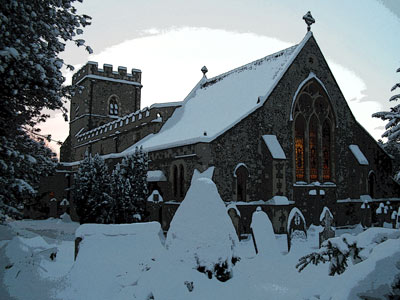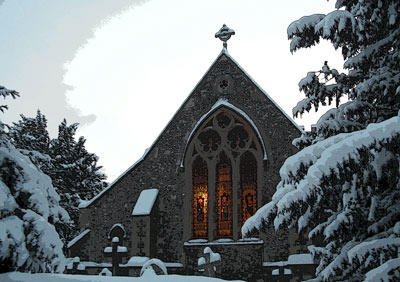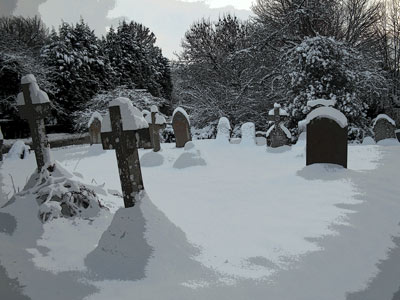I braved the elements yesterday and went to the Service of Nine Lessons and Carols at our local church, which looked rather spectacular in the snow. I took some rather lovely photos just as the light was fading, which I’ve reproduced here.

For ‘The Angel’ it’s always been my intention that something happens in the village around Christmas which symbolises Kim’s surprisingly seamless integration into the community. Â And in the sort of place where ‘The Angel’ will be set then it’s a fair bet that some sort of church carol service or similar might be a good candidate event.
Thinking about this led me on to a variation on my annual musing on the completely bizarre words that we sing to many of the most popular Christmas carols. It’s peculiar that British children sing such arcane and, in some instances, nonsensical lines but at least we all grow up with their familiarity. I wondered what a foreigner who’s otherwise fluent in English would make of the carol service hymn sheet.

Possibly the worst offender of the lot is ‘Hark the Herald Angels Sing’ — the title of which is normally misinterpreted because the hark is an exclamation, grammatically separated from the rest of the sentence. The tune, adapted from Mendelssohn is fantastically stirring but it wasn’t the original melody that Charles Wesley wrote his words for in the 18th century. Surely even then this quatrain from the second verse sounded odd:
Veiled in flesh the Godhead see;
Hail the incarnate Deity,
Pleased as man with man to dwell;
Jesus, our Emmanuel.
‘Veiled in flesh the Godhead see’ — apart from the butcherly imagery it’s a really clumsy inversion to get the rhyme with deity.
‘Adeste Fideles’ has apparently existed in Latin since the 13th century but the translation we sing as ‘O Come All Ye Faithful’ is mid-Victorian. This has a couple of great verses ‘Sing, choirs of angels, sing in exultation,’ for example, but the second verse is pretty lame:
God of God,
Light of Light,
Lo, he abhors not the Virgin’s womb;
Very God,
Begotten, not created
The third line is particularly eccentric — ‘he abhors not the Virgin’s womb’. What on earth is that meant to mean? And the fourth line seems to have thrown in the towel with a three syllable line requiring elongating to five syllables to fit the melody.

Almost certainly the most popular church services these days are the Christmas Eve midnight masses which are conveniently timed to siphon people out of the pub and into the pews. (They’re about the only times when churches are full so maybe the clergy are missing a trick the rest of the year?)
It seems some carols have been specifically written to be sung by ranks of pissed people — ‘God Rest Ye Merry Gentlemen’ is an exhortation to go to bed drunk, of which I entirely approve. Even so the line ‘This holy tide of Christmas all others doth deface’ should puzzle even the inebriated.
A couple of carols seems to have taken this principle further and have been written by people who are pissed. There can’t be any other explanation for the second verse of ‘Ding Dong Merrily On High’.
E’en so here below, below,
Let steeple bells be swungen,
And “Io, io, io!”
By priest and people sungen.
The rhyming of swungen and sungen must be unique in the English language and, perhaps, the quotation of ‘io io io’ is either an intriguing example of self-reflexiveness or simply that Charles Ratcliffe Woodward, the Victorian composer who wrote the words, had simply given up (the tune is several hundred years old). This carol is infamous for the long, extended ‘Gloria’ in the chorus, during which the amount of wavering in the singing voice  is a sure indicator of whom in the congregation on Christmas Eve is the most pissed.
As with most great pop songs, it’s the melodies that make Christmas carols enduringly popular, not the peculiar words. Many hymns also have incredibly rich and resonant tunes that have been embedded deep in the collective consciousness — something for which we have early 20th century composers such as Vaughan Williams and Holst to thank (amongst others) due to their work collecting folk music. In fact, I’d argue that carols and hymns have been one of the main influences on British popular music — the likes of the Beatles will have had the sort of education where these melodies were drilled into them. Another influence was soul music which itself adapted the melodies of these hymns sung in the American south.
One of the universally best-known melodies of all is ‘While Shepherds Watched Their Flocks By Night’ — another very ancient tune. The current words can be forgiven for being somewhat archaic as they were written around the start of the eighteenth century by the then poet laureate, Nahum Tate. It’s interesting that otherwise obsolete words, such as ‘swaddling bands’ or in ‘thus spake the seraph’ are still familiar to most people in the country.  The carol ends with one of my favourite quatrains — evoking an incredible angelic  certainty about the Christmas message:
All glory be to God on high,
And to the earth be peace.
Goodwill henceforth from heaven to men,
Begin and never cease.
